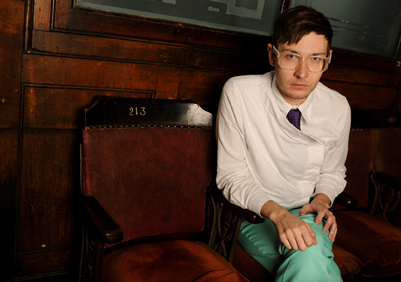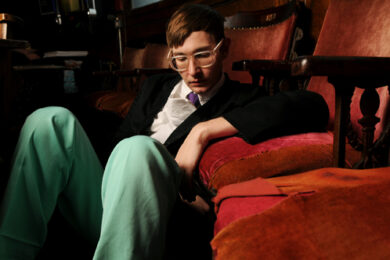One of this year’s more interesting British releases, Simon Bookish’s Everything/Everything is a musical and lyrical tour-de-force, as The Quietus review explains. In a contemporary scene overwhelmed by scruffy indie idiots still writing songs about girls on the one hand, and earnest electronica artistes bereft of joy on the other, Bookish’s output (wrapping language, communication, environmental meltdown, the meeting between Albert Einstein and Buckminster Fuller and particle physics in a sense of futuristic disquiet) a is a blast of particles whirling around a Large Hadron Collider of creativity. Bookish’s brand of intelligent pop music is sadly in short supply these days – ideas of "eccentricity" disabused, redefined as being American and Pitchfork approved, and usually flogged by earnest hippies with festering beards. Bookish, on the other hand, scored this entire record for saxophone, harp, Farfisa, and brass, a distinct change from his first two albums, produced on laptop and synth. We caught up with Simon Bookish to talk about Everything/Everything.
Hullo Simon Bookish, can you tell us a little about your past history?
The name I was born with, and use in “real life” is Leo Chadburn. Shout “Leo” in the street, if you want my attention. I come from the distant past, from a time called “classical music”, but I don’t really live there any more. I live in a suburb of futuristic big-band disco.
What does Simon Bookish do when he is not Simon Bookish?
I make pop records, music for the theatre, music for dancers, remixes, sound for art galleries and music for everything else. When I’m not doing that, and the money runs out, I go and work in libraries.
What is the point of Simon Bookish?
Making new things. Stirring old things up a bit.
Can you tell us a bit about your new LP please? Why the ‘Everything/Everything’ title?
I wanted to address the idea of the multiplicity of means of communication. We’re bombarded by information in our everyday lives, by the press, TV, the internet. All the knowledge in the world is available at the push of a button, everything that’s true alongside everything that’s conjecture. I’m interested in whether that’s empowering us, or just leading to overload. I don’t know yet…
My way of reflecting that was to write this very varied set of songs; I originally wanted to have one about art, one about science, one about language, one about maths, etc; all the fields of knowledge. Like any of the most carefully planned of recipes, it didn’t quite turn out like that, but you get the idea.
It’s also an album featuring a lot of instruments, a big group. So “everything” seems the best word to describe what I was aiming for. Twice.
Your previous albums were very much laptop records. Why did you decide to write for an ensemble?
Boredom, mainly. I know these days musicians are meant to make the same album time and time again, so no one gets confused, but I don’t see the point of endlessly repeating myself. I’ve made two albums of music based around synthesizers, so I wanted to do something else.
I also wanted the album to have this big, brassy, energised sound, so I chose a line-up of trumpets, trombones, horn, four saxophones, piano (two pianos on a couple of tracks), farfisa, harp, drums, bass, like a mutant big band. Primary colours and metallics, shiny.
Watch Simon Bookish play ‘Carbon’ and ‘Alsatian Dog’
Was it a conscious return to your classically-educated background?
A little. I knew I wanted to get away from computers, as least whilst writing the album, and for me the immediate way of doing that is to crack out music paper and scribble dots on it for hours on end.
Who are the musicians you play with live and on record?
I’m lucky enough to have lots of super-talented friends who were willing to come and work on this record. Tom Herbert (Polar Bear and The Invisible) plays bass, Alice Grant (Fulborn Teversham) does vocals with me on a few tracks. Serafina Steer plays the harp. I’ve cut down the arrangements so we can fit in a van and play live, when it’s Glyn Hill and Jim Slade on saxes, Chris Branch on Farfisa and Tom Haines on Drums.
You’ve done quite a bit of work outside Bookish. Can you tell us a little about the appearance in Caucasian Chalk Circle and the David Shrigley Worried Noodles compilation?
I wrote a new score for the CCC at the National Theatre last year. I also played ‘the singer’, the sort-of omniscient narrator of the play. The production was pretty high-tech, all video and amplification, and I was allowed to “just get on” with being Simon Bookish, which was good for me, obviously… I’m hoping to do some more things at the theatre soon.
The David Shrigley Worried Noodles compliation was a bonkers project organised by Tomlab last year. They published an album by Shrigley, except the vinyl was “missing”, because he’d written all the words and done all the artwork, then “couldn’t be bothered” to write the music.
In the end, Tomlab decided they’d quite like the songs to exist, so thirty bands and artists including me set Shrigley’s words to music. My song is a sensitive examination of the state of the monarchy called ‘Prince of Wales’ (“You will be our king when the Queen dies”).
Your lyrics often seem to focus on the minutiae of science, biography and history. What do you look for as inspiration?
I’m a bad scientist. My songs are definitely not to be relied upon for factual accuracy. I aim to make something strange (as in, unfamiliar), unexpected, fantastical, maybe unsettling. So I look for subjects like that – and there’s nothing as unfamiliar as the past, nothing as fantastical as science, so those disciplines crop up again and again.
Can you tell us a little of what inspired, say, ‘Carbon’, ‘Alsatian Dog’, a couple of tracks off the new record?
I’m interested in different ways of telling a story. Some tracks on the album are narratives; some are impressions, images, some obfuscation.
‘Carbon’ is a pretty straightforward set of references to different forms of that element (and some hydrocarbons); “grasp hold the diamond… sketch in graphite pencils… a meniscus of petrol”, but also references Einstein meeting Buckminster Fuller and apparently saying, “young man, you amaze me”. It seemed like a strange, funny, unreal image.
I can’t remember what every line of ‘Alsatian Dog’ is about, but the general theme is language change. I hate it when people moan about “declining standards in English” or whatever, since it is the nature of language to evolve, and I also believe that the English language is a powerful thing because of it’s loan words and synonyms. Its mongrel nature makes it nuanced and strong.
Then again, I can’t quite remember where the “meat rap” at the end of that song came from (“what does he eat? The French meats, venison, beef pork, etc!”).

There’s a huge sense of romanticism in your music. Would we be right in thinking that you don’t believe love songs need be confined to the boy meets girl paradigm?
Correct. There’s loads of great songs in the world about romance and fucking already. I’m much more interested in expressing something about all the other stuff there is to sing about.
What are the raw materials of musical influence that you put through the mill?
Great pop, motorik, American minimalist composers, European modernist composers, old rock stars with imaginations, machines, process music, dance music twisting out of shape.
Your performances are very visceral experiences, what do you draw on when onstage?
I don’t think it’s that conscious. When I reach the stage, I’m just having a good time and hoping everyone else is too. I think the onstage histrionics are probably just a by-product of my over-excitement.
Simon Bookish performs ‘Interview’
What’s been the best moment of Simon Bookish’s musical life thus far?
I’m meant to say, “it’s yet to come”, aren’t I?
What are three non-musical influences?
At the moment, I’m being inspired by Peter Greenaway’s early films, Bruce Nauman and Jonathan Meades on DVD.
What is the ultimate ambition for Simon Bookish?
Being able to carry on doing new things. Learning.
Simon Bookish’s Everything/Everything is out now on Tomlab. Visit the Simon Bookish mySpace
Simon Bookish portraits by Lucy Johnston. See more of her work at <a href=
"http://www.lucyjohnston.co.uk/" target="out">her website.



